Spirit
Albums reviewed on this page: Spirit,
The Family That Plays Together, Clear,
The Twelve Dreams of Dr. Sardonicus, Feedback,
Spirit of '76
Spirit came out that strange cradle of 60s rock - Los Angeles, a
city which produced a bunch of other not quite normal acts - the
Doors and Frank Zappa being famous at the time, while Love was busy
becoming a cult act. Nor is Spirit your normal, everyday group. The
band was fundamentally, well, goofy. They could never go down
the strange satire, strangeness and otherwise nuttiness of Zappa,
because that was Zappa shtick (even though he tried just about
everything). Spirit's goofiness manifested in more a playful sense -
either by putting sounds of a card game in a song, singing to
groundhogs, or advising us to go back to the zoo. These things are
not so out of place in the late 1960s, but the key is that Spirit
don't sound like they are tripped out of their minds or sloppy when
they tackle these things. I mean, they may have been, but they don't
sound like they are. This irreverence, their ability to tackle
a wide variety of musical styles with credibility, and great ear for
melodies make them forerunners of a lot of modern bands' attitudes
(I'll plead some ignorance here, but the Super Furry Animals come to
mind first).
The members who get
the most recognition are guitarist Randy California and his
step-father Ed Cassidy. California was a guitarist of great talent,
and Cassidy was an ex-jazz drummer, but one whose style had more in
common with pop-rock than the complicated patterns of a Robert Wyatt
or Bill Bruford. California had the talent to play straight hard rock
or even metal, and often it sounded like he was, especially when he
added multiple parts to a song. Whatever the prominence of those two,
one of the band's strengths was actually that their balance - in some
sort of Rousseau ideal, each member provided a good balance to the
rest. Although California deservedly received a greater share of
time, keyboardist John Locke (who could rattle of jazz solos),
bassist Mark Andes (who often cranked up along with California) and
singer Jay Ferguson (who had one of the better voices in American
rock) all contributed heavily.
These things never
last, and Spirit broke up after four albums, with California and
Cassidy keeping versions alive for some time later. Although I have
not heard their debut, I am almost certain the best place to start
with their catalog is The Twelve Dreams of Dr.
Sardonicus.
Personnel: Mark Andes (bass), Randy California
(guitar, vocals), Ed Cassidy (drums), Jay Ferguson
(vocals, keyboards), John Locke (keyboards). California,
Ferguson and Andes quit in 1970-71, with Al Staehely
(bass, vocals) and Christian Staehely (guitar) replacing them.
Band then broke up in 1972. Reformed a few years later with just
Cassidy and California.
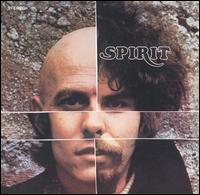 Spirit
(1968), ***
Spirit
(1968), ***
Spirit's
debut is quite the product of its day: psychedelic rock with a strong
jazz component. The band was fueled by some of the same musical
influences that produced English Canterbury bands or prog-rock, like
an disintegrated, multiple personality Yes. Perhaps this can be
explained with the fact that drummer Ed Cassidy was a jazz veteran,
while his step-son Randy California had played guitar alongside Jimi
Hendrix. As far as the actual songs go, singer Jay Ferguson was the
predominant songwriter at this point. His material is mainly
psych-pop with a tough instrumental edge (the very British and catchy
"Uncle Jack", sitar on "Girl in Your Eye", "Water
Woman"), although only the opening "Fresh Garbage" and
"Uncle Jack" really shine. Spirit's most notable feature is
the band's placement of strong jazz interludes which have nothing to
do with their psych-pop hosts ("Straight Arrow",
"Gramophone Man"), a rather unique move.
Regardless of
the dual nature of their repertoire the band's playing was
strong. California, all of 17 years of age, has the brash, distorted
tone of Hendrix, Fripp, John Roberts
("Girl in Your Eye"), or even the English
Steve Miller, and his phrasing is derived more from the blues -
pausing and accenting individual notes ("Topanga Windows").
He may have the tone worked out, but California didn't quite know
what to do with it yet, such as on the lurching "Mechanical
World." His own song, "Taurus," is a departure from
Ferguson's Beatle-fed product; a gentle classical guitar piece with
strings overdubbed Moody Blues-style; its main riff provided the
basis for Led Zeppelin's "Stairway to Heaven" a few years
later. On the opposite end, keyboardist John Locke was one of the
band's jazz-heads and his jazz instrumental "Elijah" could
easily fit on a Matching Mole album. Future Spirit albums showed the
band melding these disparate influences together, but Spirit
shows that at least one American band took jazz to heart without a
horn section.
 The
Family That Plays Together (1968), ****
The
Family That Plays Together (1968), ****
If
one did not know any better, one could write off the mixture loud
guitars, blues licks, jazzy beats, and chamber pop that fill this
album as another example of psychedelia. However, this was
Spirit's normal sound - they could deliver a dynamite mainstream rock
song ("I Got a Line on You") then turn around and combine a
Jewish traditional song with jazz (the aptly named "Jewish").
In fact, nobody was doing the latter at all, putting this
beyond normal psychedelia.
Guitarist Randy
California combined his knowledge of good riffs and loud, distorted
blues lines to deliver some dynamite mainstream rock songs ("I
Got a Line on You" which was their one fairly big song, and
"It's All the Same"), with a skill far beyond his meager
seventeen years. His sustained tone and multiple overdubs
combined with Andes solid bass push The Family That Plays Together
to the forefront of heavier American rock for 1968, even as the
band's other influences prevented them from evolving into a
proto-metal band. As the other main songwriter, singer Jay Ferguson's
songs are good, despite lacking California's consistency. Ferguson
concentrated more on piano-based psychedelia (the excellent "Dream
Within a Dream") and the character pieces which showed up
everywhere at this time ("Poor Richard", "Silky Sam",
"The Drunkard"). Whatever his shortcomings as a songwriter
- Ferguson was a really good front man; he sings without distorting
his voice, and had a strong pair of vocal chords.
Critics
sometimes note that Ed Cassidy was a jazz drummer beforehand, but
don't get too caught up on with that fact. Cassidy had own
style - not over the top, not too intricate, and a lot closer to a
pop-rock drummer than you might expect. Still, Spirit was very
jazzy in places - California's "Jewish" combines a
traditional chorus with rocking jazzy instrumental sections, and the
California/Locke song "It Shall Be" has almost a straight
jazz feel to it, right down to the flute. Despite all these
disparate musical threads, Spirit was clearly a rock band, just one
with esoteric tastes. So, even though The Family That Plays
Together may be perfect for 1968, it does not really sound like
1968 because it has aged well, and Lou Adler's production is great.
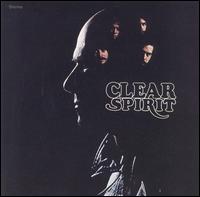 Clear
(1969), ***
Clear
(1969), ***
A transitional album, and a disconnected one. Spirit felt some
strange pull towards the blues, as well as recording instrumental
jazz, and neither sounds one bit like the other. In other words, a
typical Spirit album.
Ferguson's
psychedelic pop has vanished, and some odd blues tracks are in its
stead ("Policeman's Ball" or "Ground Hog" where
he yelps "Hey Mr. Groundhog!" on the chorus). His lyrics
are all over the map - ranging from the Jo Jo Gunne-like "I'm
Truckin'" to social commentary ("Cold Wind").
Regretfully, Ferguson was not a strong songwriter, and even when he
has an interesting idea, like putting a little dance section into
"Policeman's Ball", he offsets it by doing something
obvious, such as borrowing a musical phrase from "Lean on Me"
for "Cold Wind." Part of Spirit's charm was that they were
quirky, but here it seems only like window-dressing. California was
not too interested in playing many leads on the album, although he
does introduce some acoustic and slide work into the ever growing
array of Spirit sounds. This is not to say that the band fails when
they try their hand at blues - the album's opener "Dark Eyed
Woman" is pretty good and has a great ascending/descending riff.
It just happens to not be Spirit's strong suit.
Clear's
latter half usually sounds nothing like the first. Spirit had worked
on an obscure movie soundtrack (when was the last time a rock band
worked on a famous movie soundtrack?), and the resulting
tracks are gold. Well, gold that probably befuddled their fans anyway
- for these tracks are contemplative instrumental jazz with
tastefully orchestration ("Ice", "Clear" and
"Caught"). This is where California showed his versatility,
either through some pyrotechnics in the middle of "Ice", or
with the Wes Anderson-like guitar on "Clear".
Clear
still has plenty of good-ol' fashioned tracks that rest on a middle
ground. "So Little Time to Fly" would have been my pick for
single - a perfect explication of urban paranoia. Cities crumbling -
time to go elsewhere, away from all the unrest. Although Spirit never
left, many others did at this time, fueling the trend towards
roots-rock, country-rock and lesser offshoots of both. There is an
odd pop song on here as well - "Give a Life, Take a Life".
Great name, great line in the chorus ("You have the right to
take my life away") but a bit too tentative to be a real
success. In fact the entire album has sort of a unfinished feel to it
- few tracks beside the instrumentals sound finished, or are more
than roster fillers. Lou Adler produced again, and it sounds great.
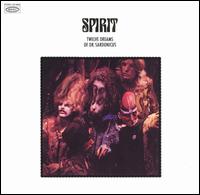 Twelve
Dreams of Dr. Sardonicus (1970), ****1/2
Twelve
Dreams of Dr. Sardonicus (1970), ****1/2
Twelve
Dreams was Spirit's apotheosis, a merger of everything they had
learned up to this point, reflecting both the richness of and
concerns about urban America. Having rid themselves of whatever odd
blues affliction haunted them on Clear, the band regained the
same focus which served them well on The Family That Plays
Together - which is to say, no particular focus at all. While
Frank Zappa was content to shift styles in an eternal parade of
sarcasm, irony, humor, and sporadic seriousness, Spirit's ability to
get inside any music style and make it their own was their greatest
strength. For that was their style - usually a bit humorous,
technical, and world-conscious, but always well-played.
Not that a
listener will be thinking about that, as the music will take them in
every time. Lou Adler is gone, replaced by David Briggs, who gives
the band a more normal production. Eclecticism can be off-putting, and
Spirit is particularly accessible on Twelve Dreams, beginning
with the opening "Nature's Way". At the outset it sounds
like the band has gone very, very hippy - acoustic guitar?
Eco-friendly lyrics? Then after a few moments, the music really kicks
in, and some wicked rock results. Eco-friendly rock, though, as the
chorus contains this unforgettable image ("We've got nothing to
hide / we're married to the same bride / she eats away from inside").
Eventually, during the instrumental break California goes off on a
turbocharged slide rampage. That, ladies and gentlemen is
Spirit. Whatever interests they pursued on Clear return in
better form on Twelve Dreams, alongside a bumper crop of new
styles. Sly Stone must have crapped his pants when he heard their
tribute to Ed Cassidy ("Mr Skin"), as Spirit nailed down
the Family's funk with a studio horn section. They go even further in
"Morning Will Come" - a terrific song whose combination of
hard rock, horns and excellent vocals foreshadows the rise of
glam-rock. This is really the blueprint for any number of current
bands who are content to bring energy and quirkiness to almost
anything and succeed. The best example is "Love Has Found a Way"
- with an odd bass/vibraphone pairing, a vocal/guitar pairing,
backwards drums and upbeat lyrics. Completely unique, strange,
excellent, and could have easily been recorded today by someone
floating around popular music's edges like the Super Furry Animals.
Only a few
songs do not rise this level - Locke's instrumental "Space
Child" incorporates a synthesizer, but lacks movement, and
Ferguson's "When I Touch You" is vaguely Asiatic hard rock
of the ho-hum specie. However, in general the band's songwriting is
at its zenith, and even Ferguson's "Animal Zoo" is a funny
and catchy song about society breaking down and having to go to the
zoo. It's interesting to note that while everyone else was heading to
the hills, Ferguson was humorously suggesting an alternate return
back to nature. In general, the band's playing is excellent, and
California deserves special praise. His slide madness during the
instrumental break is insane "Nothing to Hide", and he just
kicks his soloing up a notch in "Street Worm". He seems to
have started introducing folk elements, as we delivers a chillingly
sincere Grateful Dead like song (the brief "Why Can't I Be
Free"), as well underpinning some of the more rocking songs
("Nature's Way", "Life Has Just Begun").
In short, this
album could have been a blueprint for 70s rock - well played, funny,
concerned, and diverse. As it was, although the label released three
singles ("Animal Zoo", "Nature's Way" and "Mr.
Skin"), none of them made much impact on the charts, and music
continued to separate into smaller genres. The album itself did not
do too well, and the band also broke into smaller pieces, with
California going solo, and Ferguson and Andes forming the harder
rocking Jo Jo Gunne.
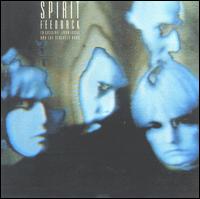 Feedback
(1972), **
Feedback
(1972), **
Even
if you had missed the band members listed on Feedback’s
cover, the first few seconds would tell you this was not the same
Spirit. Texas accent? Uncomplicated guitar playing? Female backing
singers? What is going on here? The fact is, Twelve Dreams was
not an immediate success, and the band came apart in its wake.
California left for a few solo albums, and Ferguson and Andes formed
Jo Jo Gunne to pursue harder rock. Now left without guitar, bass or
band members who were related to each other, remaining members Locke
and Cassidy welcomed aboard a pair of Texan brothers, Al and
Christian Staehely.
Thus,
a band whose identity was previously built on eclecticism became
mostly wedded to a single genre, blues-rock. One can understand the
Staehely brothers’ attraction – they played the right
instruments pretty well, Al could write songs, and they already
understood each other’s style. Al’s lyrics are
surprisingly broad-minded, as well; the opening song, “Chelsea
Girls” is about NYC’s Hotel Chelsea, and contains
references to Dylan Thomas and Andy Warhol. No cultural tunnel-vision
here. There is even a satire of the New South (“Cadillac
Cowboys”), which mocks white-collar cowboys. Beyond that,
however, their songs deal more with the usual you-look-SO-fine-babe
matters that most harder rocking groups addressed in the 1970s. These
titles betray their subject matter (“Ripe and Ready”,
“Earth Shaker”, “Witch”) with “Earth
Shaker” taking the prize for “Sweet bread baker / Bake my
cake and you’ll make a sale,” although it isn't too bad
otherwise. Every time Christian opens up a guitar solo, though, the
ghost of Randy California lingers, making the listener wonder what
might have been.
The other
musical factor is Locke, whose detailed and prominent keyboard parts
makes the band sound like Nicky Hopkins sitting in with the James
Gang (“Darkness”). Also, his two decent instrumental
tracks (“Puesta Del Scam” and “Trancas Fog-Out”)
retain Spirit’s old magic through melding jazz and rock.
However, these songs seem at odds with the un-ironic rock of the
Staehelys, who nonetheless acquit themselves well in each area. In
the end, even though David Briggs’ production is fine and the
album sounds good, it all washes out to fungible 70s rock.
Randy California: Kapt. Kopter
and the (Fabulous) Twirlybirds (1972)
In 1973, California
and Cassidy recorded an album, Adventures of Kaptain Kopter &
Commander Cassidy in Potato Land, which was released as a Spirit
album in 1981.
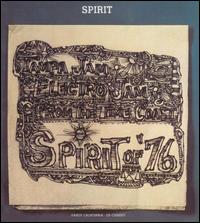 Spirit
of '76 (1975), *1/2
Spirit
of '76 (1975), *1/2
A
clever title, and an appropriate one. Hyped to give Americans
something to rally 'round in the post-Watergate era, the bicentennial
celebrations are remembered, if at all, for the atrocious objects
they produced, most often involving red,
white and blue.
This album does not betray who suggested the title, but the resulting
double-album is as varied, contradictory, and insipid as the mid to
late 70s itself. California recorded and produced an album running
the gamut of styles, while playing just about everything himself,
with the exception of Cassidy's drumming and Zappa
engineer Barry Keene playing some bass. Perhaps
California was asked to reflect upon America. Perhaps he was asked to
create a series of contrasts. Perhaps he was was asked to go into the
studio and record whatever he had plunking around in his head.
Whatever the premise, the result is an odd combination of folk, rock,
and empty space, which sounds more like well-done home demos than a
real album.
Almost all of
Spirit of '76's songs sound incomplete. Maybe since he was
overdubbing several guitar lines, California never got around to
adding some kick ass guitar parts ("Veruska" is the lone
track where he cranks it up, or really doing much with old Spirit
sounds ("Once Again" has his trademark sustain sound). More
likely he had mellowed out - the album is surprisingly folky and
light. Indeed, the action-shot! liner photos only serve to tease the
buyer - this album does not rock, it contemplates. In the intervening
years since Spirit's breakup, California had spent some time with a
guru, which might have calmed him down. Accordingly, the more
well-thought out songs are really hymns ("What Do I Have",
"When?", "Thank You Lord" the odd "Guide
Me"), which is both odd and understandable. Call this the mature
Spirit - the one that does not party much.
Still,
California's light tenor is better suited for quieter music, and when
he tries to belt it out he sounds like a poor man's Jimi Hendrix.
California was friends with Hendrix (who even suggested California's
name), which makes Spirit's cover of "Hey Joe" a bit
uncomfortable. On most of this album California seems to be bogged
down in atmospheric guitar effects; rather than creating interesting
leads, California smothers his sound with reverb and sustain. Yet, on
"Hey Joe" he lets it fly, although his various guitar
overdubs overlap and almost cancel each other out. When combined with
California's Hendrix-like vocals, what was intended as a tribute
becomes almost a parody. At least Ed Cassidy still can create a great
drum line at the drop of a hat ("Joker on the Run", the
sci-fi "Uranta").
There
are tons of song linkages which are typically bizarre, but not very
entertaining. An aimless studio jam ("Tampa Jam") comes and
goes at will, as does some quirky echoed nonsense spoken by one of
the band's friends ("Jack-Bond" discussing the "time
coast"), and studio chatter. The only things anchoring this
album are the traditional pieces. It does not say much when the most
put-together track is the national anthem. California's folk
interpolation of "America the Beautiful" and "The
Times They Are A'Changing" is an inspired decision, but the
others only highlight the original compositions' shortfalls. It seems
clear that California considers rock songs traditional pieces as
well, paying homage to the past, without doing anything interesting
(the aforementioned "Hey Joe", "Like a Rolling Stone",
the Stones' "I Need Love"). Then again, maybe this is
California's vision of America - weakened, without substance, with
only the past as real achievements. Although California's intent is
unknown, this album is showpiece for the mid-70s artistic collapse of
older rock groups.
In the end,
there might be some reason for recording this, but its release is
baffling. As for Spirit, California and Cassidy soldiered on, making
albums which were indifferently received throughout the Seventies,
and into the Eighties.
 Spirit
(1968), ***
Spirit
(1968), *** The
Family That Plays Together (1968), ****
The
Family That Plays Together (1968), **** Clear
(1969), ***
Clear
(1969), *** Twelve
Dreams of Dr. Sardonicus (1970), ****1/2
Twelve
Dreams of Dr. Sardonicus (1970), ****1/2 Feedback
(1972), **
Feedback
(1972), ** Spirit
of '76 (1975), *1/2
Spirit
of '76 (1975), *1/2